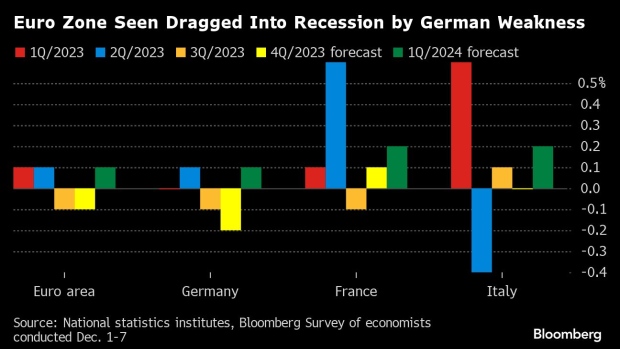Recession in Europe is coming according to economists’ predictions. 2023 will end in contraction for the single currency region’s economy, with Germany leading the decline.

Europe - specifically the Eurozone - will end 2023 in recession according to a Bloomberg survey.
The economists interviewed by the newspaper confirmed the weakness of the single currency region, struggling with fragile industrial production driven above all by the ongoing economic crisis in Germany.
As announced several times by analysts, the recession now seems inevitable for the Eurozone countries. The analysis comes three days before the last ECB meeting, scheduled for 14 December. Aggressive monetary policy, with a record interest rate hike in 2023, is the main cause of having favored an economic worsening in the region. While the high cost of money erodes loans and mortgages, weakening demand, the uncertain German scenario accelerates Europe’s slide into recession.
The recession is coming to the Eurozone. What do the experts predict?
Economists interviewed by Bloomberg from 1 to 7 December had no doubts: the Eurozone will not escape its first recession since the post-pandemic.
The 0.1% contraction is now expected between September and December compared with the previous survey’s projection that output would remain unchanged. The estimate, therefore, is of a worsening. Only at the beginning of 2024 will the Eurozone be able to expect a slight improvement thanks to modest growth.
The weakness of the old continent is undoubtedly driven by Germany, the largest European economy, which is struggling above all to relaunch the key sector of its productive and economic strength, the manufacturing sector. Hit by a budget crisis and weak global demand - as well as by the epochal challenges of the energy transition, high inflation, and decoupling from China - the country is expected to suffer a decline of 0.2 % in the fourth quarter, higher than the 0.1% decline initially expected.
Bloomberg’s summary graph is interesting to understand how the forecasts of the analysts interviewed have darkened:

Also noteworthy is the Italian stagnation, which should remain stable in the fourth quarter and then recover in 2024. Italy’s situation is worse than the French one, but not Germany’s. The German state is expected to grow by just 0.1% in the first 3 months of next year.
The survey results contrast with the European Commission’s November forecast, which calls for a return to euro area growth this quarter, aided by a sharp decline in inflation and a robust labor market.
Furthermore, a more restrictive monetary policy could fuel some optimism. The recent slowdown in consumer price growth has surprised both markets and politicians, prompting bets on the ECB’s first interest rate cuts already in the spring.
Economists have lowered their inflation projections to September 2024. However, quarterly forecasts have been raised beyond that mark, and do not expect price increases to slow to the ECB’s 2% target during the survey period.
The Eurozone is still very fragile. “We doubt we are at the beginning of a recovery”, said Joerg Angele, an economist at Bantleon Bank. “Headwinds remain strong, especially those resulting from the massive increase in interest rates ”.
Original article published on Money.it Italy 2023-12-11 12:53:40. Original title: Europa, il 2023 si chiuderà in recessione. La previsione che allarma





